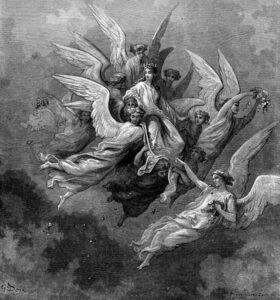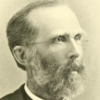Not one drop of blood
is left inside my veins that does not throb:
I recognize signs of the ancient flame.[Men che dramma
di sangue m’è rimaso, che non tremi;
conosco i segni de l’antica fiamma.]Dante Alighieri (1265-1321) Italian poet
The Divine Comedy [Divina Commedia], Book 2 “Purgatorio,” Canto 30, l. 46ff (3.46-68) (1314) [tr. Musa (1981)]
(Source)
Dante, on seeing his long-lost love, Beatrice, repeating to Virgil the lines he had given Dido (Aeneid, 4.23) about how she felt the stirring of long-dead passion upon seeing Aeneas: "Agnosco veteris vestigia flammae" ("I know the traces of the ancient flame" [tr. Kline (2002)]).
(Source (Italian)). Alternate translations:
There is no dram of blood,
That doth not quiver in me. The old flame
Throws out clear tokens of reviving fire.
[tr. Cary (1814)]
There is not one drop
Of blood within me trembling but became:
I know the tokens of the ancient fame.
[tr. Bannerman (1850)]
Not a drachm
Of blood remains in me, that does not tremble;
I know the traces of the ancient flame.
[tr. Longfellow (1867)]
Less than a dram of blood remains to me which trembles not; I recognise the signs of the ancient flame.
[tr. Butler (1885)]
Rests within my frame
No dram of blood that does not tremble now;
I know the symptoms of the olden flame.
[tr. Minchin (1885)]
Less than a drachm of blood remains in me that doth not tremble; I recognize the signals of the ancient flame.
[tr. Norton (1892)]
Less than a drachm of blood
is left in me that trembleth not; I recognise
the tokens of the ancient flame.
[tr. Okey (1901)]
Not a drop of blood is left in me that does not tremble; I know the marks of the ancient flame.
[tr. Sinclair (1939)]
Scarce one drop remains
Of blood in me that trembles not: by this
I recognize the old flame within my veins.
[tr. Binyon (1943)]
There is scarce a dram
That does not hammer and throb in all my blood;
I know the embers of the ancient flame.
[tr. Sayers (1955)]
There is not within me
one drop of blood unstirred. I recognize
the tokens of the ancient flame.
[tr. Ciardi (1961)]
Less than a drop of blood
Is left in me, that is not trembling:
I know the signs of the ancient flame.
[tr. Sisson (1981)]
I am left with less
than one drop of blood that does not tremble:
I recognize the signs of the old flame.
[tr. Mandelbaum (1982)]
There is a barely a drop of blood in me that does not tremble: I know the tokens of the ancient flame.
[tr. Kline (2002)]
Less than a dram of blood is left me that is not trembling: I recognize the signs of the ancient flame!
[tr. Durling (2003)]
There is not one gram
of blood in me that does not tremble now.
I recognize the signs of ancient flame.
[tr. Kirkpatrick (2007)]
Not a single drop of blood
remains in me that does not tremble --
I know the signs of the ancient flame.[tr. Hollander/Hollander (2007)]
There isn't a single drop of whatever blood
Still flows in my veins that isn't shaking from fear:
I recognize the signs of that ancient fire.
[tr. Raffel (2010)]
I had seen a herd of Elephant traveling through dense Native forest, where the sunlight is strewn down between the thick creepers in small spots and patches, pacing along as if they had an appointment at the end of the world.
Isak Dinesen (1885-1962) Danish writer [pseud. of Karen Christence, Countess Blixen]
Out of Africa, Part 1 “Kamante and Lulu,” “The Ngong Farm” (1937)
(Source)
Misbehavior and punishment are not opposites that cancel each other; on the contrary, they breed and reinforce each other. Punishment does not deter misconduct. It makes the offender more skillful in escaping detection. When children are punished they resolve to be more careful, not more obedient or responsible.
Haim Ginott (1922-1973) Israeli-American school teacher, child psychologist, psychotherapist [b. Haim Ginzburg]
Between Parent and Child: Revised and Updated Edition, ch. 5 “Discipline” (2003 ed.) [with A. Ginott and H. W. Goddard]
(Source)
France was long a “Despotism tempered by Epigrams.”
Thomas Carlyle (1795-1881) Scottish essayist and historian
The French Revolution: A History, Part 1, Book 2, ch. 4 (1.2.4) (1837)
(Source)
Though given in quotation marks, Carlyle is apparently "quoting" himself.
This quotation is commonly given on its own, though, since Carlyle's thesis at this point in his history is that the royal government had largely become irrelevant in the nation, he continues:
... and now, it would seem, the Epigrams have got the upper hand.
[Source]
I don’t know ov a better kure for sorrow than tew pity sum boddy else.
[I don’t know of a better cure for sorrow than to pity somebody else.]
And yet there are some men here in this Senate who either genuinely fail to see, or make a pretense of not seeing, the disasters by which we are menaced. Their mildness has fostered Catiline’s hopes, and their refusal to believe in his growing conspiracy has given it strength. Had I punished Catiline, their influence would cause many persons, some of them malignant but others merely ignorant, to say that I had acted with tyrannical brutality.
[Quamquam non nulli sunt in hoc ordine qui aut ea quae imminent non videant aut ea quae vident dissimulent; qui spem Catilinae mollibus sententiis aluerunt coniurationemque nascentem non credendo conroboraverunt; quorum auctoritate multi non solum improbi verum etiam imperiti, si in hunc animadvertissem, crudeliter et regie factum esse dicerent.]
Marcus Tullius Cicero (106-43 BC) Roman orator, statesman, philosopher
Orationes in Catilinam [Catilinarian Orations], No. 1, § 12, cl. 30 (1.12.30) (63-11-08 BC) [tr. Grant (1960)]
(Source)
Urging the Senate banish Catiline before he and his followers overthrow the Roman Republic.
(Source (Latin)). Alternate translations:
Although there are some in this House, who either not see what is imminent, or dissemble what they see; who have cherish'd the hopes of Catiline with useless (?) Votes, and have confirmed the rising Conspiracy, by not believing it: whose Authority many, not onely out of malice, but of simplicity following, had I executed him, would have said, it had been a cruel and tyrannical Act
[tr. Wase (1671)]
Yet even now, in this very assembly, there are senators, and those not a few, who do not see the impending danger; or, seeing it, think proper to disguise their sentiments. By specious moderation they have pampered the hopes of Catiline, and, affecting to think my fears no more than a false alarm; they favoured the conspiracy in its birth; By their example numbers have been influenced; the evil-minded raised a spirit of discontent, and the weak joined in the clamour, All of that description would be ready to pronounce the death of Catiline the act of a violent and arbitrary Consul.
[tr. Sydney (1795)]
Though there are some men in this body who either do not see what threatens, or dissemble what they do see; who have fed the hope of Catiline by mild sentiments, and have strengthened the rising conspiracy by not believing it; influenced by whose authority many, and they not wicked, but only ignorant, if I punished him would say that I had acted cruelly and tyrannically.
[tr. Yonge (1856)]
Although there are in this assembly some who either may not see those things which are impending, or who may conceal their knowledge of those things which they see; who have nourished the hope of Catiline by mild opinions, and who have strengthened the growing conspiracy by not believing it; following whose authority many, not only the wicked, but also the unskillful, if I should have inflicted punishment on him, would say that this had been done cruelly and tyrannically.
[tr. Mongan (1879)]
Although there are some in this order (assembly), who either may see not those (things) which impend, or may dissemble those (things), which they see: who have nourished the hope of Catiline by soft (mild) opinions, and have strengthened the growing conspiracy by believing (it) not. The authority of whom many having followed, not only the dishonest, but also the unskillful, if I might have animadverted upon him (if I had punished him), would say (it) to have been done cruelly and royally (tyrannically).
[tr. Underwood (1885)]
Although there are some in this order [body], who either may not see these (things) which impend, or may dissemble those (things) which they see: who have nourished the hope of Catiline by soft [mild] opinions, and have strengthened the growing conspiracy by not believing (it). The authority of whom many have followed, not only the dishonest, but also the inexperienced, if I had given attention to [punished] him they, would say )it) to have [had] been done cruelly and royally [tyrannically].
[tr. Dewey (1916)]
And yet there are several men in this body, of the kind who either do not see what is threatening to them, or disguise what things they see, and these men nourish the hope of Catiline by tender notions and strengthen the young conspiracy by not believing; by whose authority many not only wicked (men), but also inexperienced (men), if I were to have (Catiline) punished , would say that it had been done cruelly and despotically.
[IB Notes]
The gift of imagination is by no means an exclusive property of the artist; it is a gift we all share; to some degree or other all of us, all of you, are endowed with the powers of fantasy.
Leonard Bernstein (1918-1990) American conductor, composer, author, music lecturer, pianist
Commencement Speech, Johns Hopkins University (1980-05-30)
(Source)
Collected in Findings: Fifty Years of Meditations on Music, Part 4 (1982).
In truth, it is not want, but rather abundance, that breeds avarice.
[De vray, ce n’est pas la disette, c’est plustost l’abondance qui produict l’avarice.]
Michel de Montaigne (1533-1592) French essayist
Essays, Book 1, ch. 14 “The Taste of Good and Bad Things Depends Mostly on the Opinion We Have of Them [Que le goust des biens et des maux despend en bonne partie de l’opinion que nous en avons]” (1572) (1.14) (1595) [tr. Frame (1943)]
(Source)
Though this chapter was written around 1572 for the 1580 edition, this text was added for the 1588 edition. The chapter as a whole was numbered ch. 14 in the 1580 and 1588 editions, moved to ch. 40 for the 1595 ed. Most modern translations use the original numbering.
(Source (French)). Alternate translations:
Verily, it is not want, but rather plenty that causeth avarice.
[tr. Florio (1603), ch. 40]
In plain truth, it is not Want, but rather Abundance, that Creates Avarice.
[tr. Cotton (1686), ch. 40]
In truth, it is not want, but rather abundance, that creates avarice.
[tr. Cotton/Hazlitt (1877), ch. 40]
In truth, it is not want, but rather abundance, which gives birth to avarice.
[tr. Ives (1925)]
And truly it is not want that produces avarice but plenty.
[tr. Screech (1987)]
Truly, abundance rather than want causes stinginess.
[tr. HyperEssays (2023)]
Ye Venuses and Cupids mourn,
Ye whom the graces most adorn,
Come, and your tears of sorrow shed:
My Lesbia’s little bird is dead.[Lugete, o Veneres Cupidinesque
et quantum est hominum venustiorum!
passer mortuus est meae puellae,
passer, deliciae meae puellae.]Catullus (c. 84 BC – c. 54 BC) Latin poet [Gaius Valerius Catullus]
Carmina # 3 “Death of the Sparrow,” ll. 1-4 [tr. Bliss (1872)]
(Source)
(Source (Latin)). Alternate translations:
Mourn all ye Loves! ye Graces mourn!
My Lesbia's fav'rite sparrow's gone!
Ye men for wit, for taste, preferr'd,
Lament my girl's departed bird!
[tr. Nott (1795)]
Mourn, all ye loves and graces; mourn,
Ye wits, ye gallant, and ye gay;
Death from my fair her bird has torn,
Her much-loved Sparrow's snatch'd away.
[tr. Lamb (1821)]
Loves and Graces, mourn with me,
Mourn, fair youths, where'er ye be!
Dead my Lesbia's sparrow is,
Sparrow, that was all her bliss.
[tr. T. Martin (1861)]
Ye Graces! mourn, oh mourn!
Mourn, Cupids Venus-born!
And loveliest sons of earth, where'er ye are !
Dead is now my darling's sparrow --
Sparrow of my "winsome marrow,"
Than her very eyes, oh! dearer to her far.
[tr. Cranstoun (1867)]
Weep each heavenly Venus, all the Cupids,
Weep all men that have any grace about ye.
Dead the sparrow, in whom my love delighted,
The dear sparrow, in whom my love delighted.
[tr. Ellis (1871)]
Weep every Venus, and all Cupids wail,
And men whose gentler spirits still prevail.
Dead is the Sparrow of my girl, the joy,
Sparrow, my sweeting's most delicious toy.
[tr. Burton (1893)]
O mourn, you Loves and Cupids, and all men of gracious mind. Dead is the sparrow of my girl, sparrow, darling of my girl.
[tr. Smithers (1894)]
Mourn, all ye Loves, ye Loves and Cupids, mourn,
Make moan for heaviness, ye gallants bright,
For Lesbia's bird, my Lesbia weeps forlorn;
He's dead -- poor, pretty bird -- my love's delight!
[tr. Harman (1897)]
Mourn, ye Graces and Loves, and all you whom the Graces love. My lady's sparrow is dead, the sparrow my lady's pet.
[tr. Warre Cornish (1904)]
Mourn, all ye Graces, mourn, ye Sons of Love, and all whose hearts engender pity. The sparrow of my beloved is no more; that sparrow, the delight of my beloved.
[tr. Stuttaford (1912)]
Weep, weep, ye Loves and Cupids all,
And ilka Man o’ decent feelin’:
My lassie’s lost her wee, wee bird,
And that’s a loss, ye’ll ken, past healin’.
[tr. Davies (1912)]
Let Venus bow her head in grief,
And tears drown Cupid's eyes in sorrow,
And men of feeling everywhere
Forget to smile -- until tomorrow.
My lady's little bird lies dead,
The bird that was my lady's prize.
[tr. Stewart (1915)]
Weep, ye gods of love and pleasure,
Weep, all all ye of finer clay,
Weep, my darling's lost her treasure,
Mourn her sparrow passed away!
[tr. Symons-Jeune (1923)]
Mourn Loves and Graces all, and you
Of men the lovelier chosen few.
The sparrow of my love is dead,
The playmate of my love is sped.
[tr. MacNaghten (1925)]
Dress now in sorrow, O all
you shades of Venus,
and your little cupids weep.
My girl has lost her darling sparrow.
[tr. Gregory (1931)]
Lament, o graces of Venus, and Cupids,
and cry out loud, men beloved by Her graces.
Pass here, it's dead, meant so much to my girl, the
sparrow, the jewel that delighted my girl.
[tr. Zukofsky (1959)]
Mourn, oh Cupids and Venuses,
and whatever there is of rather pleasing men:
the sparrow of my girlfriend has died,
the sparrow, delight of my girl.
[tr. Sullvan (1997)]
Mourn, O you Loves and Cupids
and such of you as love beauty:
my girl’s sparrow is dead,
sparrow, the girl’s delight.
[tr. Kline (2001)]
Mourn, Cupids all, every Venus,
and whatever company still exists of caring people:
Sparrow lies dead, my own true sweegheart's sparrow.
[tr. Green (2005)]
Mourn, Oh Venuses and Cupids
And all men of finer feeling
The sparrow of my girl has died,
the sparrow, my lady's pet.
[tr. Wikibooks (2017)]
Mourn, O Venuses and Cupids
and however many there are of more charming people:
my girl's sparrow is dead --
the sparrow, delight of my girl.
[tr. Wikisource (2018)]
When one admits that nothing is certain one must, I think, also admit that some things are much more nearly certain than others. It is much more nearly certain that we are assembled here tonight than it is that this or that political party is in the right. Certainly there are degrees of certainty, and one should be very careful to emphasize that fact, because otherwise one is landed in an utter skepticism, and complete skepticism would, of course, be totally barren and completely useless.
Bertrand Russell (1872-1970) English mathematician and philosopher
“Am I an Atheist or an Agnostic?” sec. “Skepticism” (1949)
(Source)
Originally given as a speech, "Agnosticism v. Atheism," Rationalist Press Assoc. Annual Dinner, London (1949-05-20); then printed as "Agnosticism v. Atheism," The Literary Guide and Rationalist Review (1949-07); then released as an essay under this title later in 1949.
He called to mind all the millionaires he had ever read or heard of; they didn’t seem to get much fun out of their riches. The majority of them were martyrs to dyspepsia. They were often weighed down by the cares and responsibilities of their position; the only people who were unable to obtain an audience of them at any time were their friends; they lived in a glare of publicity, and every post brought them hundreds of begging letters, and a few threats; their children were in constant danger from kidnappers, and they themselves, after knowing no rest in life, could not be certain that even their tombs would be undisturbed. Whether they were extravagant or thrifty, they were equally maligned, and, whatever the fortune they left behind them, they could be absolutely certain that, in a couple of generations, it would be entirely dissipated.
F. Anstey (1856-1934) English novelist and journalist (pseud. of Thomas Anstey Guthrie)
The Brass Bottle, ch. 7 (1900)
(Source)
Children live in occupied territory. The brave and the foolhardy openly rebel against authority, whether harsh or benign. But most tread warily, outwardly accommodating themselves to alien mores and edicts while living in secret their iconoclastic and subversive lives.
P. D. James (1920-2014) British mystery writer [Phyllis Dorothy James White]
Time To Be in Earnest: A Fragment of Autobiography, “Diary 1997” (1999)
(Source)
Let us not envy a certain class of men for their enormous riches; they have paid such an equivalent for them that it would not suit us; they have given for them their peace of mind, their health, their honour, and their conscience; this is rather too dear, and there is nothing to be made out of such a bargain.
[N’envions point à une sorte de gens leurs grandes richesses; ils les ont à titre onéreux, et qui ne nous accommoderait point: ils ont mis leur repos, leur santé, leur honneur et leur conscience pour les avoir; cela est trop cher, et il n’y a rien à gagner à un tel marché.]Jean de La Bruyère (1645-1696) French essayist, moralist
The Characters [Les Caractères], ch. 6 “Of Gifts of Fortune [Des Biens de Fortune],” § 13 (6.13) (1688) [tr. Van Laun (1885)]
(Source)
One translator suggestions the "certain class of men" refers to the partisans, or tax-farmers: private tax collectors, often of humble origin, who purchased the right to their job, and were notorious for turning tax collection into a profitable profession.
(Source (French)). Alternate translations:
Let us not envy some Men their great Riches; their Burthens would be too heavy for us; we cou'd not Sacrifice, as they do, Health, Quiet, Honour and Conscience, to obtain 'em: 'Tis to pay so dear for them that there is nothing to be got by the Bargain.
[Bullord ed. (1696)]
Let us not envy some Men their great Riches, their burden would be too heavy for us; we cou'd not sacrifice, as they do, Health, Quiet, Honour and Conscience, to obtain 'em: 'Tis to pay so dear for 'em, that there is nothing to be got by the Bargain.
[Curll ed. (1713)]
Let us not envy some Men their accountable Riches; their Burthen would be too heavy for us; we could not sacrifice, as they do, Health, Quiet, Honour and Conscience, to obtain them. It is to pay so dear for them, that the Bargain is a Loss.
[Browne ed. (1752)]
We need not envy certain people their great wealth; they acquired it at a heavy cost, which would not suit us; they staked their rest, their health, their honour and their conscience to acquire it; the price is too high, and there is nothing to be gained by such a bargain.
[tr. Stewart (1970)]
DELUGE, n. A notable first experiment in baptism which washed away the sins (and sinners) of the world.
Ambrose Bierce (1842-1914?) American writer and journalist
“Deluge,” The Cynic’s Word Book (1906)
(Source)
Included in The Devil's Dictionary (1911). Originally published in the "Devil's Dictionary" column in the San Francisco Wasp (1882-01-20).
The original Wasp entry included a second sentence: "Since then it has been deemed advisable to let the sinners remain on their good behavior."
The central task of education is to implant a will and facility for learning; it should produce not learned but learning people. The truly human society is a learning society, where grandparents, parents, and children are students together.
Eric Hoffer (1902-1983) American writer, philosopher, longshoreman
Reflections on the Human Condition, ch. 1, # 32 (1973)
(Source)
Science doesn’t supply happiness; but neither does its lack. The same can be said of social utopias: they aren’t created by science, but neither does lack of science provide them. Science has cast up dangerous and cruel knowledge, which has been exploited for warfare and dictatorial power; but so have cultures so little gifted with scientists that they either make do with imported weapons or rely on clubs, axes, and daggers. Scientific information about our mistakes — for instance, that deforestation invites mud slides and deserts, that overfishing depletes fish stocks — doesn’t guarantee we will avoid such mistakes or correct them, but that is owing to failure to heed what science uncovers.
Jane Jacobs (1916-2006) American-Canadian journalist, author, urban theorist, activist
Dark Age Ahead, ch. 3 “Science Abandoned” (2004)
(Source)
Now Scripture enjoins nothing except charity, and condemns nothing except lust, and in that way fashions the lives of men.
[Non autem praecipit Scriptura nisi caritatem, nec culpat nisi cupiditatem, et eo modo informat mores hominum.]
Augustine of Hippo (354-430) Christian church father, philosopher, saint [b. Aurelius Augustinus]
On Christian Doctrine [De Doctrina Christiana], Book 3, ch. 10 / § 15 (3.10.15) (AD 397) [tr. Shaw (1858)]
(Source)
On how people treat Scripture as literal when it agrees with their and their culture's judgment, and figurative when not.
(Source (Latin)). Alternate translations:
But Scripture teaches nothing but charity, nor condemns anything except cupidity, and in this way shapes the minds of men.
[tr. Robertson (1958)]
Scripture enjoins nothing but love, and centures nothing but lust, and moulds men's minds accordingly.
[tr. Green (1995)]
But we are so blind to our own shortcomings, so wide awake to those of others. Everything that happens to us is always the other person’s fault. Angelina would have gone on loving Edwin forever and ever and ever if only Edwin had not grown so strange and different. Edwin would have adored Angelina through eternity if Angelina had only remained the same as when he first adored her.
It is a cheerless hour for you both when the lamp of love has gone out and the fire of affection is not yet lit, and you have to grope about in the cold, raw dawn of life to kindle it. God grant it catches light before the day is too far spent. Many sit shivering by the dead coals till night come.Jerome K. Jerome (1859-1927) English writer, humorist [Jerome Klapka Jerome]
Idle Thoughts of an Idle Fellow, “On Being In Love” (1886)
(Source)
PRINCE: In time the savage bull doth bear the yoke.
BENEDICK The savage bull may, but if ever the sensible Benedick bear it, pluck off the bull’s horns and set them in my forehead, and let me be vilely painted, and in such great letters as they write “Here is good horse to hire” let them signify under my sign “Here you may see Benedick the married man.”
William Shakespeare (1564-1616) English dramatist and poet
Much Ado About Nothing, Act 1, sc. 1, l. 256ff (1.1.256-262) (1598)
(Source)
Wedlock, as old Men note, hath likened been,
Unto a publick Crowd or common Rout;
Where those that are without would fain get in,
And those that are within would fain get out.
Life’s race well run,
Life’s work well done,
Life’s crown well won,
Now comes rest.Edward H. Parker (1823-1896) American physician, poet
Epitaph of President James Garfield (1881)
(Source)
The phrase was engraved on a tablet placed at the head of his coffin while he lay in state at Cleveland's Memorial Park.
The passage was selected by a committee without a clear source of the material, but it appears to be a loose transcription of the first stanza of a poem Parker wrote for his mother-in-law's funeral:
Life's race well run,
Life's work all done,
Life's victory won,
Now cometh rest.
The differences may be because the Garfield epitaph was back-translated from a Latin translation of Parker's original.
Much more discussion here.
To discern faults, though they be in fashion: Though Vice be clothed in cloth of gold, yet a good man will still know it. It is to no purpose for it to be apparelled in gold, it can never so well disguise it self but that it will be perceived to be of iron. It would cloak it self with the nobility of its Adherents, but it is never stript of its baseness, nor the misery of its slavery.
[Conocer los defectos, por más autorizados que estén. No desconozca la entereza el vicio, aunque se revista de brocado; corónase tal vez de oro, pero no por eso puede disimular el yerro. No pierde la esclavitud de su vileza aunque se desmienta con la nobleza del sujeto.]
Baltasar Gracián y Morales (1601-1658) Spanish Jesuit priest, writer, philosopher
The Art of Worldly Wisdom [Oráculo Manual y Arte de Prudencia], § 186 (1647) [Flesher ed. (1685)]
(Source)
(Source (Spanish)). Alternate translations:
Recognise Faults, however high placed. Integrity cannot mistake vice even when clothed in brocade or perchance crowned with gold, but will not be able to hide its character for all that. Slavery does not lose its vileness, however it vaunt the nobility of its lord and master.
[tr. Jacobs (1892)]
Know what is evil, however much worshiped it may be. Let the man of intelligence not fail to recognize it, even if clothed in brocade, or crowned with gold, because it cannot thereby hide its bane, -- slavery does not lose its infamy, however noble the master.
[tr. Fischer (1937)]
Know when something is a defect, even if it looks like the opposite. Honesty should be able to recognize vice even when it dresses in brocade. Sometimes it wears a crown of gold, but even then it cannot hide its iron. Slavery is just as vile when disguised by high position.
[tr. Maurer (1992)]
And remember, we all stumble, every one of us. That’s why it’s a comfort to go hand in hand.
Emily Kimbrough (1899-1989) American author and journalist
The Innocents from Indiana, ch. 17 (1950)
(Source)
At the very end of the book, a note from the protagonist's mother, about the protagonist having failed the entrance examination to Bryn Mawr.
For in and out, above, about, below,
‘Tis nothing but a Magic Shadow-show,
Play’d in a Box whose Candle is the Sun,
Round which we Phantom Figures come and go.Omar Khayyám (1048-1123) Persian poet, mathematician, philosopher, astronomer [عمر خیام]
Rubáiyát [رباعیات], Bod. # 108 [tr. FitzGerald, 1st ed. (1859), # 46]
(Source)
The fanúsi khiyál, was an Indian magic lantern still used in Fitzgerald's day, "the cylindrical Interior being painted with various Figures, and so lightly poised and ventilated as to revolve round the candle lighted within."
Alternate translations:
Yon rolling heavens, at which we gaze bewildered,
Are but the image of a magic lanthorn;
The sun is the candle, the world the shade,
And we the images which flit therein.
[tr. Cowell (1858), # 28]
We are no other than a moving row
Of visionary Shapes that come and go
Round with this Sun-illumin'd Lantern held
In Midnight by the Master of the Show.
[tr. FitzGerald, 2nd Ed (1868), # 73]
We are no other than a moving row
Of Magic Shadow-shapes that come and go
Round with the Sun-illumin'd Lantern held
In Midnight by the Master of the Show.
[tr. FitzGerald, 3rd ed. (1872), # 68; and subsequent eds.]
This vault of heaven under which we move in a vain shadow, may be likened unto a lantern; the sun is the focus, and we, like the figures, live there in amazement.
[tr. McCarthy (1879), # 230]
These circling heavens, which make us so dismayed,
I liken to a lamp's revolving shade,
The sun the candlestick, the earth the shade,
And men the trembling forms thereon portrayed.
[tr. Whinfield (1882), # 165]
This wheel of heaven, which makes us all afraid,
I liken to a lamp's revolving shade,
The sun the candlestick, the earth the shade,
And men the trembling forms thereon portrayed.
[tr. Whinfield (1883), # 310]
A Turning Magic Lantern show this World,
Around the Sun as Candle swiftly whirled,
While mortals are but Phantom Figures traced
Upon the Shade, forever Onward hurled.
[tr. Garner (1887), 9.4]
This vault of Heaven at which we gaze astounded,
May by a painted lantern be expounded:
The light's the Sun, the lantern is the World,
And We the figures whirling dazed around it!
[tr. M. K. (1888)]
This vault of heaven, beneath which we stand bewildered,
we know to be a sort of magic. lantern:
know thou that the sun is the lamp flame and the universe is the lamp,
we are like figures that revolve in it.
[tr. Heron-Allen (1898), # 108]
This heavenly dome, where we distracted dwell,
Is likest to a magic lantern made;
The sun the candle and the world the screen,
And we the images that flit and fade.
[tr. Cadell (1899), # 125]
Passionate particles of dust and sun,
Run your brief race, nor ask why it is run --
We are but shadow-pictures, voices, dreams;
Perchance they make and break us -- just for fun.
[tr. Le Gallienne (1902)]
This wheel of Heaven which we amazed discern.
Is like a Chinese lantern, as we learn;
The Sun the lamp, the World the lantern is.
And we like figures are that on it turn.
[tr. Thompson (1906), # 353]
This vault of Heaven, 'neath which like fools we sit,
Is but a magic-lantern, dimly lit:
The sun the flame, the Universe the lamp,
We are the figures that revolve in it.
[tr. Talbot (1908), # 108]
This revolving sphere in which we stand bewildered
Is like unto a Chinese lantern,
The sun, its lamp and its shade the world,
We, the figures moving within it.
[tr. Rosen (1928), # 207]
Methinks this Wheel at which we gape and stare,
Is Chinese lantern -- like we buy at fair;
The lamp is Sun, and paper-shade the world,
And we the pictures whirling unaware.
[tr. Tirtha (1941), # 2.5]
This vault underneath which we lie bemused
Is, so to speak, God's magic shadow show
With sun for lamp, the world as a wide screen
For countless lie-rehearsing silhouettes.
[tr. Graves & Ali-Shah (1967)]
This Universal wheel, this merry-go-round
In our imagination we have found
The sun a flame, in the Cosmic lantern bound
We are mere ghosts, revolving, the flame surround.
[tr. Shahriari (1998), literal]
In our imagination, the Cosmic Wheel
Will cause us pain and cause us heal,
We find our source give life and steal,
We are phantoms that think and feel.
[tr. Shahriari (1998), figurative]
The search for a personal identity is the life task of a teenager.
Haim Ginott (1922-1973) Israeli-American school teacher, child psychologist, psychotherapist [b. Haim Ginzburg]
Between Parent and Teenager, ch. 2 “Rebellion and Response” (1969)
(Source)
Iz it charity tew giv tew a thankless cuss in need? certainly; jest az mutch az it would be to save a drouning cow.
[Is it charity to give to a thankless cuss in need? Certainly; just as much as it would be to save a drowning cow.]
Josh Billings (1818-1885) American humorist, aphorist [pseud. of Henry Wheeler Shaw]
Everybody’s Friend, Or; Josh Billing’s Encyclopedia and Proverbial Philosophy of Wit and Humor, ch. 132 “Affurisms: Chips” (1874)
(Source)
But if you have a fear of unpopularity, is that arising from the imputation of vigour and boldness, or that arising from that of inactivity and indecision most to be feared? When Italy is laid waste by war, when cities are attacked and houses in flames, do you not think that you will be then consumed by a perfect conflagration of hatred?
[Sed si quis est invidiae metus, non1 est vehementius severitatis ac fortitudinis invidia quam inertiae ac nequitiae pertimescenda. An, cum bello vastabitur Italia, vexabuntur urbes, tecta ardebunt, tum te non existimas invidiae incendio conflagraturum]
Marcus Tullius Cicero (106-43 BC) Roman orator, statesman, philosopher
Orationes in Catilinam [Catilinarian Orations], No. 1, § 11, cl. 29 (1.11.29) (63-11-08 BC) [tr. Yonge (1856)]
(Source)
Speaking (aloud, rhetorically) to himself about his concerns of public reaction to his acting so passionately against Cataline's conspiracy.
(Source (Latin)). Alternate translations:
But if there be any fear of Envy, is the Censure of Severity and Courage more greatly to be feared, than that of Baseness and Cowardise? Do you not think, when Italy shall be made desolate with War, the Cities plundered, the Houses a-fire, you shall then fall under a flagrant Envy?
[tr. Wase (1671)]
If fear is to operate, which do you think is most to be dreaded, reproach for cowardice, or censure for magnanimity? When Italy is laid waste; when her cities are taken by storm; when her temples and mansions are wrapt in flames; it is then your danger will begin; it is then that the clamours of mankind will be loud against you.
[tr. Sydney (1795)]
But if there is any fear of odium, whether should the odium resulting from severity and determinati0on be dreaded more violently than that of indolence and wickedness? Whether, when Italy shall be ravaged by war, when the cities shall be harassed, when roofs shall be burning, dost thou not think that thou then will burn with a conflagration of odium?
[tr. Mongan (1879)]
But if there is any fear of envy (displeasure), whether is the envy of severity and of fortitude to be feared more violently, than (that) of inactivity and of negligence? Whether, when Italy shall be devastated with war, cities shall be burned, roofs (houses) shall be on fire: dost thou think thyself not (to be) about to burn then with a conflagration of envy (unpopularity)?
[tr. Underwood (1885)]
But if there is any fear of ill will, is the ill will because of strictness and courage to be feared more strongly, than (that) because of inactivity and negligence? When Italy shall be devastated with war, cities shall be harassed, roofs [houses] shall burn: do you think (you) yourself will not (about to) be consumed then with a conflagration of ill will?
[tr. Dewey (1916)]
If the question of inviting disapproval arises at all, the unpopularity resulting from firmness and determination is no more to be dreaded than the opprobrium produced by culpable failure to act. For when Italy is to be ravaged by war, when cities are assaulted and houses gutted by fire, do you not see how utterly the flames of hatred will consume you then?
[tr. Grant (1960)]
But if there is any fear of hatred, it is not hatred of harshness and firmness requiring to be feared more violently than (hatred) of idleness and worthlessness. Or when Italy is laid waste to, the cities will be harassed, the buildings will burn, then do you not think that you will be consumed by burning hatred?
[IB Notes]
‘Tis for little Souls, that truckle under the Weight of Affairs, not to know how clearly to disengage themselves, and not to know how to lay them aside, and take them up again.
[C’est aux petites ames ensevelies du poix des affaires, de ne s’en sçavoir purement desmesler : de ne les sçavoir et laisser et reprendre.]Michel de Montaigne (1533-1592) French essayist
Essays, Book 3, ch. 13 “On Experience [De l’Experience]” (1588) (3.13) (1595) [tr. Cotton (1686)]
(Source)
(Source (French)). Alternate translations:
It is for base and pettie mindes, dulled and overwhelmed with the weight of affaires, to be ignorant how to leave them, and not to know how to free themselves from them; nor how to leave and take them againe.
[tr. Florio (1603)]
’Tis for little souls, that truckle under the weight of affairs, not from them to know how clearly to disengage themselves, not to know how to lay them aside and take them up again.
[tr. Cotton/Hazlitt (1877)]
It is for small souls, buried under the weight of affairs, not to know how to free themselves therefrom entirely; not to know how to leave them and return to them.
[tr. Ives (1925)]
It is for little souls, buried under the weight of business, to be unable to detach themselves cleanly from it or to leave it and pick it up again.
[tr. Frame (1943)]
It is for petty souls overwhelmed by the weight of affairs to be unable to disentangle themselves for them completely, not knowing how to drop them and then take them up again.
[tr. Screech (1987)]
You never know what worse luck your bad luck has saved you from.
Cormac McCarthy (1933-2023) American novelist, playwright, screenwriter
No Country for Old Men (2005)
(Source)
Whatever then its value be,
Accept this little book from me;
And, o protecting Virgin, deign
It may for centuries remain![Quare habe tibi quidquid hoc libelli
qualecumque, quod, o patrona virgo,
plus uno maneat perenne saeclo.]Catullus (c. 84 BC – c. 54 BC) Latin poet [Gaius Valerius Catullus]
Carmina # 1 “To Cornelius Nepos,” ll. 8-10 [tr. Nott (1795), l. 11ff.]
(Source)
Dedicating the book to his friend and patron, as well as to Pallas Athena.
(Source (Latin)). Alternate translations:
Then take the book I now address,
Though small its size, its merit less,
'Tis all thy friend can give;
And let me, guardian Muse, implore
That when at least one age is o'er,
This volume yet may live.
[tr. Lamb (1821), st. 3]
Then take this little book, whae'er
Of good or bad it store;
And grant, oh guardian Muse, that it
May keep the flavour of its wit
A century or more.
[tr. T. Martin (1861), st. 3]
Wherefore accept my tiny leaves, I pray,
Such as they are, -- and, Patron Goddess, give
This boon: that still perennial they may live
After a century has roll'd away.
[tr. Cranstoun (1867)]
Therefore welcome it, yours the little outcast,
This slight volume. O yet, supreme awarder,
Virgin, save it in ages on for ever.
[tr. Ellis (1871), st. 4]
So take, whate'er its worth may be,
My Book, -- but, Lady and Queen of Song,
This one gift I crave of thee,
That it may live for ages long!
[tr. Lang (1888)]
Then take thee whatso in this booklet be,
Such as it is, whereto O Patron Maid
To live down Ages lend thou lasting aid!
[tr. Burton (1893)]
Therefore take this booklet, such as it is, and, O Virgin Patroness, may it outlive generations more than one.
[tr. Smithers (1894)]
So take and keep for your own this little book, such as it is, and whatever it is worth; and may it, O Virgin my patroness, live and last for more than one century.
[tr. Warre Cornish (1904)]
Accept, therefore, this little book and all that it contains, such as it is; and, O guardian maiden, ordain that it shall outlive this generation.
[tr. Stuttaford (1912)]
So take my small book -- if it meet with your favor,
The passing of years cannot dull its sweet savor.
[tr. Stewart (1915)]
Do thou then accept this booklet, I pray;
And grant, Virgin muse, that, if such be its worth,
It outlive the one age that has given it birth.
[tr. Symons-Jeune (1923)]
Therefore the book how slight soe'er,
Be yours: and thou, kind Muse, prolong
More than one age my timeless song.
[tr. MacNaghten (1925)]
Wherefore, dear friend, this humble volume take,
With all its imperfections, for my sake;
Which with Minerva's favour yet may last
When you and I into the dust have passed.
[tr. Wright (1926)]
Then, take this little book
for what it is, my friend.
Patroness and Muse,
keep these poems green for
a day or so beyond a hundred years.
O Virgin!
[tr. Gregory (1931)]
And so it's yours; I hand this slim book over,
such as it is -- for the sake of its patron
may it survive a century or better.
[tr. C. Martin (1979)]
Then take this little book for your own: whatever
it is, and is worth: virgin Muse, patroness,
let it last, for more lives than one.
[tr. Kline (2001)]
For that reason have for yourself whatever this little book is,
and whatever you like, oh patron maiden,
let it last a long time, for more than one generation!
[tr. Ozlem (2003)]
So take this little booklet, this mere trifle,
whatever it may be worth -- and Patron Virgin,
let it outlast at least one generation!
[tr. Green (2005)]
Book of mine for what it’s worth; whatever;
And oh, patroness Virgin, grant that it shall
Live and survive beyond the century.
[tr. Ferry (2012)]
For this reason have for yourself whatever this is of a little book,
Such as it is; O virgin patron,
That it may endure for more than one age.
[tr. Wikibooks (2017)]
So keep for yourself this little book of some sort.
May it last, O generous goddess!,
more than one long age.
[tr. Wikisource (2018)]
As a philosopher, if I were speaking to a purely philosophic audience I should say that I ought to describe myself as an Agnostic, because I do not think that there is a conclusive argument by which one prove that there is not a God. On the other hand, if I am to convey the right impression to the ordinary man in the street I think that I ought to say that I am an Atheist, because, when I say that I cannot prove that there is not a God, I ought to add equally that I cannot prove that there are not the Homeric gods.
Bertrand Russell (1872-1970) English mathematician and philosopher
“Am I an Atheist or an Agnostic?” sec. “Proof of God” (1949)
(Source)
Originally given as a speech, "Agnosticism v. Atheism," Rationalist Press Assoc. Annual Dinner, London (1949-05-20); then printed as "Agnosticism v. Atheism," The Literary Guide and Rationalist Review (1949-07); then released as an essay under this title later in 1949.
Childhood is the world of miracle and wonder; as if creation rose, bathed in light out of the darkness, utterly new and fresh and astonishing. The end of childhood is when things cease to astonish us. When the world seems familiar, when one has got used to existence, one has become adult. The brave new world, the wonderland has grown trite and commonplace.
[L’enfance c’est le monde du miracle ou du merveilleux: c’est comme si la creation surgissait, lumineuse, de la nuit, toute neuve et toute fraîche, et tout étonnante. Il n’y a plus d’enfance à partir du moment où les choses ne sont plus étonnantes. Lorsque le monde vous semble «déja vu», lorsqu’on s’est habitué à l’existence, on devient adulte. Le monde de la féerie, la merveille neuve se fait banalité, cliché.]Eugène Ionesco (1912-1994) Romanian-French dramatist
Fragments of a Journal [Journal en Miettes], “The Crisis of Language” (1967) [tr. Stewart (1968)]
(Source)
There is this disadvantage to be endured in reading books by members of some party or faction, that they do not always give us the truth. Facts are distorted, opposing points of view are not stated with sufficient force or with complete accuracy; and the most longsuffering reader must tire at last of such a great number of harsh and insulting terms used against one another by these earnest men, who make a personal quarrel out of a doctrinal point or a disputed fact. The peculiar thing about these works is that they deserve neither the prodigious vogue they enjoy for a while nor the profound neglect into which they lapse when, passions and divisions having died down, they become like last year’s almanacs.
[L’on a cette incommodité à essuyer dans la lecture des livres faits par des gens de parti et de cabale, que l’on n’y voit pas toujours la vérité. Les faits y sont déguisés, les raisons réciproques n’y sont point rapportées dans toute leur force, ni avec une entière exactitude; et, ce qui use la plus longue patience, il faut lire un grand nombre de termes durs et injurieux que se disent des hommes graves, qui d’un point de doctrine ou d’un fait contesté se font une querelle personnelle. Ces ouvrages ont cela de particulier qu’ils ne méritent ni le cours prodigieux qu’ils ont pendant un certain temps, ni le profond oubli où ils tombent lorsque, le feu et la division venant à s’éteindre, ils deviennent des almanachs de l’autre année.]
Jean de La Bruyère (1645-1696) French essayist, moralist
The Characters [Les Caractères], ch. 1 “Of Works of the Mind [Des Ouvrages de l’Esprit],” § 58 (1.58) (1688) [tr. Stewart (1970)]
(Source)
Some translators suggests this references polemical writings between the Jesuits and Jansenists.
(Source (French)). Alternate translations:
We have this disadvantage in reading Books written by Men of Party and Cabal: We seldom meet with the Truth in 'em; Actions are there disguised, the reasons of both sides are not alledg'd with all their force, nor with an entire exactness. He who has the greatest patience must read abundance of hard, injurious reflexions on the gravest men, with whom the Writer has some personal quarrel about a point of Doctrine, or matter of Controversie. These Books are particular in this, that they deserve not the prodigious Sale they find at their first appearance, nor the profound Oblivion that attends 'em after∣wards: When the fury and division of these Authors cease, they are forgotten, like an Almanack out of date.
[Bullord ed. (1696)]
We have this Inconveniency in reading Books written by Men of Party and Cabal, we seldom meet Truth in them; Actions are there disguis'd, the Reasons of both sides not alledg'd with all their force, nor with an entire exactness. He who has the greatest Patience, must read abundance of hard and scurrilous Reflections on the gravest Men, who make a personal Quarrel about a Point of Doctrine, or Matter of Controversy. These Books are particular in this, that they deserve not the prodigious Sale they find at their first appearance, nor the profound Oblivion which attends 'em afterwards. When the Fury and Division of Parties cease, they are forgotten like Almanacks out of date.
[Curll ed. (1713)]
This is the certain disadvantage of reading Books written by Men of Party and Cabal, Truth is not in them; Actions are disguised, the Reasons of both sides are not alledged with all their force, nor with an entire exactness. And, what no patience can bear, he must read abundance of scurrilous Reflections tost to and fro by grave Men, making a personal Quarrel about a Point of Doctrine, or controverted Fact. These Books are particular in this, that they deserve not the prodigious Sale they find at their first appearance, nor the profound Oblivion that attends them afterwards: When the Ebullitions of Parties subside, they are forgotten like an Almanack out of date.
[Browne ed. (1752)]
The disadvantage of reading books written by people belonging to a certain party or a certain set is that they do not always contain the truth. Facts are disguised, the arguments on both sides are not brought forward in all their strength, nor are they quite accurate; and what wears out the greatest patience is that we must read a large number of harsh and scurrilous reflections, tossed to and fro by serious-minded men, who consider themselves personally insulted when any point of doctrine or any doubtful matter is controverted. Such works possess this peculiarity, that they neither deserve the prodigious success they have for a certain time, nor the profound oblivion into which they fall afterwards, when the rage and contention have ceased, and they become like almanacks out of date.
[tr. Van Laun (1885)]
Chance is necessity hidden behind a veil.
[Zufall ist die in Schleier gehüllte Nothwendigkeit.]
Marie von Ebner-Eschenbach (1830-1916) Austrian writer
Aphorisms [Aphorismen], No. 10 (1880) [tr. Scrase/Mieder (1994)]
(Source)
A thing I am not anxious to preserve
Is this frail life; for soon as one woe ends,
Others commence, and our weak eyes discern not
What evil fortunes yet remain behind.[αἰεὶ τὸ µὲν ζῇ, τὸ δὲ µεθίσταται κακόν,
τὸ δ’ αὖ πέφηνεν αὖθις ἐξ ἀρχῆς νέον.]Euripides (485?-406? BC) Greek tragic dramatist
Æolus [Αἴολος], frag. 35 (TGF) [tr. Wodhull (1809)]
(Source)
Nauck frag. 35, Barnes frag. 51, Musgrave frag. 15, 16. (Source (Greek)). Alternate translations:
One ill is ever clinging;
One treads upon its heels;
A third, in distance springing,
Its fearful front reveals.
[tr. Peacock (1897)]
One trouble alive and well, another gone,
as all afresh a new one comes our way.
[Source]
Elitism is repulsive when based upon external and artificial limitations like race, gender, or social class. Repulsive and utterly false — for that spark of genius is randomly distributed across all cruel barriers of our social prejudice. We therefore must grant access — and encouragement — to everyone; and must be increasingly vigilant, and tirelessly attentive, in providing such opportunities to all children. We will have no justice until this kind of equality can be attained. But if only a small minority respond, and these are our best and brightest of all races, classes, and genders, shall we deny them the pinnacle of their soul’s striving because all their colleagues prefer passivity and flashing lights? Let them lift their eyes to hills of books, and at least a few museums that display the full magic of nature’s variety. What is wrong with this truly democratic form of elitism?
Stephen Jay Gould (1941-2002) American paleontologist, geologist, biologist
Dinosaur in a Haystack: Reflections in Natural History, Part 5, ch. 18 “Cabinet Museums: Alive, Alive, O!” (1995)
(Source)
To science, not even the bark of a tree or a drop of pond water is dull or a handful of dirt banal. They all arouse awe and wonder.
Jane Jacobs (1916-2006) American-Canadian journalist, author, urban theorist, activist
Dark Age Ahead, ch. 4 “Science Abandoned” (2004)
(Source)
But we are so blind to our own shortcomings, so wide awake to those of others. Everything that happens to us is always the other person’s fault. Angelina would have gone on loving Edwin forever and ever and ever if only Edwin had not grown so strange and different. Edwin would have adored Angelina through eternity if Angelina had only remained the same as when he first adored her.
It is a cheerless hour for you both when the lamp of love has gone out and the fire of affection is not yet lit, and you have to grope about in the cold, raw dawn of life to kindle it. God grant it catches light before the day is too far spent. Many sit shivering by the dead coals till night come.Jerome K. Jerome (1859-1927) English writer, humorist [Jerome Klapka Jerome]
Idle Thoughts of an Idle Fellow, “On Being in Love” (1886)
(Source)
BEATRICE: I had rather hear my dog bark at a crow than a man swear he loves me.
William Shakespeare (1564-1616) English dramatist and poet
Much Ado About Nothing, Act 1, sc. 1, l. 129ff (1.1.120-130) (1598)
(Source)
You and I are old;
Old age hath yet his honour and his toil;
Death closes all: but something ere the end,
Some work of noble note, may yet be done,
Not unbecoming men that strove with Gods.
Nearly all of history is only a string of horrors. If tyrants dismiss it while they are alive, it seems that their successors allow people to transmit to posterity the crimes of their predecessors, in order to offer diversion away from the horror that they inspire themselves.
[Presque toute l’Histoire n’est qu’une suite d’horreurs. Si les tyrans la détestent, tandis qu’ils vivent, il semble que leurs successeurs souffrent qu’on transmette à la postérité les crimes de leurs devanciers, pour faire diversion à l’horreur qu’ils inspirent eux-mêmes.]
Nicolas Chamfort (1741-1794) French writer, epigrammist (b. Nicolas-Sébastien Roch)
Products of Perfected Civilization [Produits de la Civilisation Perfectionée], Part 1 “Maxims and Thoughts [Maximes et Pensées],” ch. 8, ¶ 474 (1795) [tr. Siniscalchi (1994)]
(Source)
(Source (French)). Alternate translations:
Nearly all History is a procession of horrors; but, although tyrants hate History in their own lifetime, a general transmission of such crimes is not unpleasing to their descendants, for it distracts attention from their own.
[tr. Mathers (1926)]
Almost the whole of history is nothing but a series of horrors. If tyrants detest it while they are alive, their successors seem willing to allow the crimes of their predecessors to be transmitted to posterity, to divert attention from the horror that they themselves inspire.
[tr. Merwin (1969)]
Almost the whole of history is nothing more than a series of horrors. If tyrants detest it while they are alive, it seems that their that their successors suffer that the crimes of their predecessors should be laid at the door of posterity, in order to divert attention from the horrors to which they themselves give rise.
[tr. Pearson (1973)]
Almost all of history is a story of horror. If tyrants condemn it during their lifetime, their successors seem to allow the crimes of their predecessors to be passed on to posterity, thereby diverting attention from the horror they themselves inspire.
[tr. Parmée (2003)]
BENEDICK: What, my dear Lady Disdain! Are you yet living?
BEATRICE: Is it possible disdain should die while she hath such meet food to feed it as Signior Benedick? Courtesy itself must convert to disdain, if you come in her presence.
William Shakespeare (1564-1616) English dramatist and poet
Much Ado About Nothing, Act 1, sc. 1, l. 116ff (1.1.116-121) (1598)
(Source)
When we look forward and try to project what may come out of a development, we are always wrong, because the by-products sometimes become far more important than the primary thing you started out to accomplish. Nevertheless, unintelligent motion is a great deal more important in research than intelligent standing still.
Charles F. Kettering (1876-1958) American inventor, engineer, researcher, businessman
“250 at Luncheon Honor Kettering,” New York Times (1936-11-11)
(Source)
Everybody knows if you are too careful you are so occupied in being careful that you are sure to stumble over something.
Gertrude Stein (1874-1946) American expatriate author, feminist
Everybody’s Autobiography, ch. 1 (1937)
(Source)
When all sinnes grow old, coveteousnesse is young.
George Herbert (1593-1633) Welsh priest, orator, poet.
Jacula Prudentum, or Outlandish Proverbs, Sentences, &c. (compiler), # 18 (1640 ed.)
(Source)
A thought is often original, though you have uttered it a hundred times. It has come to you over a new route, by a new and express train of associations.
Your responsibility as a parent is not as great as you might imagine. You need not supply the world with the next conqueror of disease or major motion-picture star. If your child simply grows up to be someone who does not use the word “collectible” as a noun, you can consider yourself an unqualified success.
Oh, God, I know no joy as great as a moment of rushing into a new love, no ecstasy like that of a new love. I swim in the sky; I float; my body is full of flowers, flowers with fingers giving me acute, acute caresses, sparks, jewels, quivers of joy, dizziness, such dizziness. Music inside of one, drunkenness. Only closing the eyes and remembering, and the hunger, the hunger for more, more, the great hunger, the voracious hunger, and thirst.
If there is an all-powerful and loving God in this world, why is there so much excruciating pain and unspeakable suffering? The problem of suffering has haunted me for a very long time. It was what made me begin to think about religion when I was young, and it was what led me to question my faith when I was older. Ultimately, it was the reason I lost my faith.
Bart D. Ehrman (b. 1955) American Biblical scholar, author
God’s Problem, ch. 1 “Suffering and a Crisis of Faith” (2008)
(Source)
So up I got in anger,
And took a book I had,
And put a ribbon on my hair
To please a passing lad.
And, “One thing there’s no getting by —
I’ve been a wicked girl.” said I;
“But if I can’t be sorry, why,
I might as well be glad!”Edna St. Vincent Millay (1892-1950) American poet
“The Penitent”, st. 3, A Few Figs from Thistles (1921)
(Source)
Life in itself
Is nothing,
An empty cup, a flight of uncarpeted stairs.
The task of war is to destroy life; the task of peace is to create it; to organize labor so that it shall not incapacitate men for leisure; to establish justice as a foundation for personality; to unfold in men the capacity for noble joy and profound sorrow; to liberate them for the passion of love, the perception of beauty, the contemplation of truth. Of all these things war is the enemy.
G. Lowes Dickinson (1862-1932) British political scientist and philosopher [Goldsworthy "Goldie" Lowes Dickinson]
“The War and the Way Out: A Further Consideration,” sec. 3, Atlantic Monthly (1915-04)
(Source)
For ourselves and for the present, we are safe; our immediate peril is past. But for how long are we safe; and how far have we removed our peril? If our nation could not itself exist half slave and half free, are we sure that it can exist in a world half slave and half free? Is the same conflict less irrepressible when world wide than it was eighty years ago when it was only nation wide? Right knows no boundaries, and justice no frontiers; the brotherhood of man is not a domestic institution.
Learned Hand (1872-1961) American jurist
“A Pledge of Allegiance,” speech, Central Park, New York City (1945-05-20)
(Source)
His second "I Am an American Day" address. Collected in The Spirit of Liberty (1953).
There is, incidentally, no way of talking about cats that enables one to come off as a sane person.
Dan Greenburg (1936-2023) American writer, humorist, journalist
In Bill Hayward, Cat People (1978)
(Source)
The same holds true of almost every superstition — as astrology, dreams, omens, judgments, and the like — wherein men, pleased with such vanities, attend to those events which are fulfilments; but neglect and pass over the instances where they fail (though this is much more frequently the case).
[Eadem ratio est fere omnis superstitionis, ut in astrologicis, in somniis, ominibus, nemesibus, et hujusmodi; in quibus homines delectati hujusmodi vanitatibus advertunt eventus, ubi emplentur; ast ubi fallunt, licet multo frequentius, tamen negligunt et praetereunt.]
Francis Bacon (1561-1626) English philosopher, scientist, author, statesman
Instauratio Magna [The Great Instauration], Part 2 “Novum Organum [The New Organon],” Book 1, Aphorism # 46 (1620) [tr. Johnson (1859)]
(Source)
See also Bacon.
(Source (Latin)). Alternate translations:
All superstition is much the same, whether it be that of astrology, dreams, omens, retributive judgment, or the like; in all of which the deluded believers observe events which are fulfilled, but neglect and pass over their failure, though it be much more common.
[tr. Wood (1831)]
And such is the way of all superstition, whether in astrology, dreams, omens, divine judgments, or the like; wherein men, having a delight in such vanities, mark the events where they are fulfilled, but where they fail, though this happen much oftener, neglect and pass them by.
[tr. Spedding (1858)]
The same method is found, perhaps, in every superstition, like astrology, dreams, omens, divine judgements, and so on: people who take pleasure in such vanities notice the results when they are fulfilled, but ignore and overlook them when they fail, though they do fail more often than not.
[tr. Silverthorne (2000)]
That’s how it is with all superstition -- involving astrology, dreams, omens, divine judgments, and the like, Men get so much pleasure out of such vanities that they notice the confirming events and inattentively pass by the more numerous disconfirming ones.
[tr. Bennett (2017)]











































